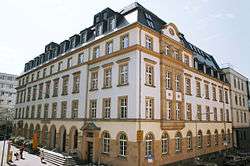ProCredit Bank
ProCredit Bank AG Deutschland is a bank based in Frankfurt, Germany, and is a fully owned subsidiary of ProCredit Holding AG & Co. KGaA. It supports the ProCredit group worldwide in various business areas and offers banking services for small and medium-sized enterprises (SMEs) as well as for private individuals.[2] ProCredit Bank is the most recently established bank in the ProCredit group, which operates primarily in Southeastern and Eastern Europe as well as in Ecuador.
 | |
| Aktiengesellschaft | |
| Founded | 2012 |
| Headquarters | Frankfurt, Germany |
Key people | Christian Kistner, Emilia Tzareva (Management Board) Dr Gabriel Schor (Supervisory Board) |
| Total assets | €718.4 million (2019)[1] |
Number of employees | 60 (2019)[1] |
| Parent | ProCredit Holding AG & Co. KGaA |
| Website | www.procreditbank.de/en/ |
By performing responsible banking operations and providing services for its affiliated banks, ProCredit Bank aims to contribute to the sustainable economic development of the developing and emerging countries in which the ProCredit group is active.
Banking operations for customers in Germany were launched in March 2013.[3]
Business model
ProCredit Bank Germany provides financial services for the ProCredit banks worldwide and also offers private and business customers in Germany a platform for engagement in Southeastern and Eastern Europe as well as Ecuador, with a particular focus on SMEs.
ProCredit Bank has an exclusion list for activities that it will not finance.[4] When granting loans, it also takes into account a range of environmental risks[5] that are clearly defined in the group’s Environmental Management System (EMS). The EMS is an integral part of the corporate strategy of all ProCredit banks, it is oriented towards social and ecological aspects and is based on a three-pillar approach. This comprises internal environmental management (Pillar I), the assessment of environmental and social risks in lending (Pillar II) and “Green Finance” (Pillar III), which includes the promotion of green loans and is the strategic focus for financing projects in the areas of energy efficiency and renewable energies (this does not apply to ProCredit Bank Germany).[6]
One of the functions of ProCredit Bank Germany is to act as a service bank for the other banks in the ProCredit group. It supports the liquidity management and financing of the ProCredit Holding Banks.
The ProCredit Bank is subject to German statutory deposit insurance. In addition, it is affiliated to the Deposit Guarantee Fund of the Bundesverband deutscher Banken.[7] This increases the security limit to €12,945,000 per customer.
Ownership
ProCredit Holding (PCH) based in Frankfurt, Germany, which is a listed company and also the parent company of the ProCredit group, holds 100% of the bank’s shares. Zeitinger Invest GmbH and ProCredit Staff Invest GmbH & Co KG[8] are important shareholders of ProCredit Holding. Zeitinger Invest GmbH was founded in 2016 as a spin-off from Internationale Projekt Consult GmbH (IPC). The company is not only a shareholder, it is the strategic and entrepreneurial driving force behind the ProCredit group. ProCredit Staff Invest is a vehicle for investing the savings of ProCredit group employees.
Other important shareholders include the German state development bank Kreditanstalt für Wiederaufbau (KfW) and the International Finance Corporation (IFC, a member of the World Bank Group) as well as the Dutch DOEN Foundation. In addition, various long-term and development-oriented investment companies also hold shares in PCH.[9]
Banking supervision
Since the granting of the banking licence for ProCredit Bank in Germany, the ProCredit banking group worldwide has been under the consolidated supervision of the German Federal Financial Supervisory Authority (BaFin) and the Deutsche Bundesbank. Therefore, in order to comply with German regulatory requirements, group-wide risk management and uniform reporting systems have been established for ProCredit banks in all countries.[10]
References
- "Bundesanzeiger". Retrieved 2020-06-02.
- "ProCredit Holding Website: ProCredit Bank Germany". Retrieved 2020-04-20.
- "ProCredit Bank Germany Website". ProCredit Bank. Retrieved 2020-04-20.
- "ProCredit Bank Germany Website: How we think and act "green": Our environmental management system". Retrieved 2020-04-20.
- "ProCredit Bank Germany Website: What we offer our clients". Retrieved 2020-04-20.
- "ProCredit Bank Germany Website: How we think and act "green": Our environmental management system". Retrieved 2020-04-20.
- "Mitglieder Entschädigungseinrichtung deutscher Banken GmbH (EdB) (Compensation Scheme of German Private Banks), EdB". Retrieved 2020-04-20.
- "ProCredit Holding Website: Shareholder structure". Retrieved 2020-04-20.
- "ProCredit Holding Website: Managers". Retrieved 2020-04-20.
- "ProCredit Bank Germany Website: Why we think regulation is important". Retrieved 2020-04-20.